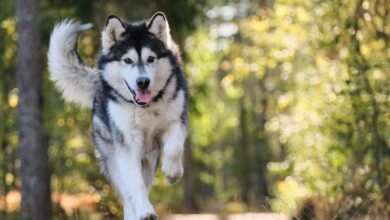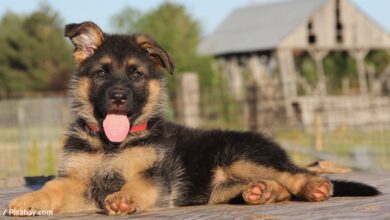When Does a Rottweiler Reach Old Age?
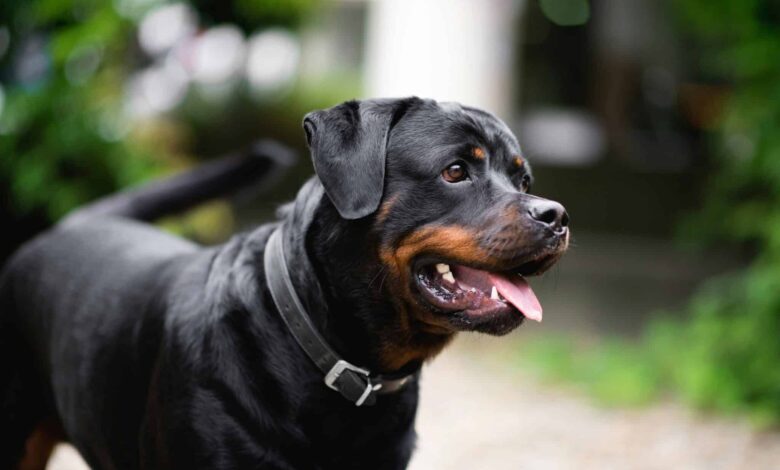
Rottweilers, affectionately known as Rotties, are renowned for their strength, loyalty, and distinctive black-and-tan coats. These gentle giants are often misunderstood due to their imposing appearance, but in reality, they are loving, affectionate, and often downright goofy with their families. Rottweilers are versatile dogs, excelling in roles from guard dogs to therapy animals, thanks to their intelligence and trainability. However, like all dogs, Rottweilers eventually enter their senior years, even if they try to convince you otherwise with their playful antics. Typically, a Rottweiler is considered a 7 to 8-year-old senior, though some may show signs of aging earlier or later depending on their health and lifestyle. As they age, Rottweilers may swap their zoomies for more sedate activities, but they never lose their loving spirit. Let’s explore the different stages of a Rottweiler’s life and see how these noble dogs age with grace, humor, and a touch of stubbornness.
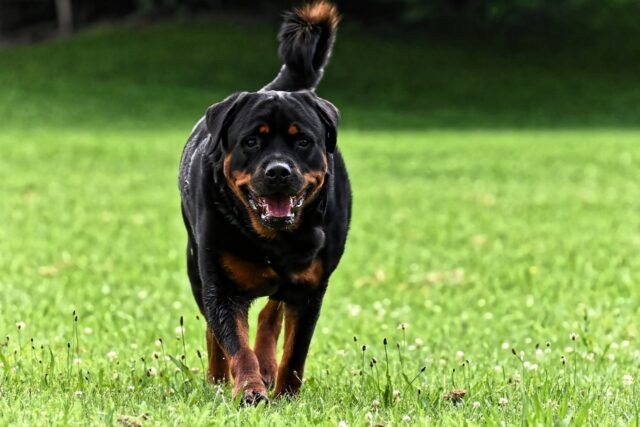
1. The Puppy Phase: Adorable Bears of Mischief
In the first year of a Rottweiler’s life, they are a bundle of energy, curiosity, and an endless source of amusement. These puppies resemble little bear cubs with their round faces and stocky builds. They are known for their playful nature and often have a penchant for getting into things they shouldn’t. Rottweiler puppies are quick learners, but their strong will and stubborn streak mean they require consistent training from an early age. This phase is characterized by lots of play, chewing on everything in sight, and an insatiable curiosity about the world around them. Despite their mischievous behavior, they are incredibly affectionate and love cuddling with their human family members.
2. The Adolescent Years: The Awkward Teenager
Rottweilers enter their adolescent phase at around 1 to 2 years old. This is when they start to test boundaries and assert their independence, sometimes leading to a bit of rebellious behavior. Adolescence is a time of significant physical growth and development, with Rottweilers often looking lanky and awkward as they grow into their adult bodies. This stage requires continued training and socialization to ensure they develop into well-behaved adults. Despite the occasional stubbornness, Rottweilers in this phase are still playful and energetic. They are also starting to show more protective instincts, making training and proper socialization even more important.
3. The Prime Years: Strong, Steady, and Loyal
Between 2 and 6 years old, Rottweilers are in their prime. These years are characterized by peak physical condition and a balanced temperament. Rottweilers in their prime are strong, confident, and highly trainable. They are excellent working dogs, often excelling in roles such as search and rescue, police work, and therapy. At the same time, they are loving and gentle companions at home, enjoying both active play and relaxed cuddle sessions. This stage showcases their loyalty and protective nature, making them excellent guardians for their families. They are often the epitome of the breed’s motto: calm and confident, with a keen sense of loyalty and devotion to their loved ones.
4. The Middle Ages: The Mature Companion
Around 6 to 8 years old, Rottweilers enter their middle-aged years. They may slow down during this time, preferring more restful activities over-vigorous exercise. They might not have the same endurance as in their prime, but they still enjoy regular walks and moderate play. This stage often brings a more relaxed and mellow demeanor, although they can still be playful when the mood strikes. You might also notice some physical changes, such as graying fur around the muzzle and a softer, more dignified appearance. Rottweilers in their middle years continue to be affectionate and loyal, often becoming even more closely bonded with their human families.
5. The Senior Years: Gentle Giants with Wisdom
When a Rottweiler reaches 7 to 8 years old, they are generally considered seniors. This phase is marked by a noticeable reduction in energy levels and a greater appreciation for napping in cozy spots. Senior Rottweilers may develop age-related health issues such as arthritis, hip dysplasia, or heart conditions, affecting their mobility and overall well-being. Despite these changes, they remain loving and loyal companions. They enjoy gentler activities, like short walks and leisurely play, and cherish their time with their families. Senior Rottweilers often develop a wise and gentle demeanor, and their bond with their human companions deepens. They continue to bring joy and comfort, even if their days of boundless energy are behind them.
With their powerful builds and tender hearts, Rottweilers bring joy at every stage of life. From the playful puppy phase to the gentle senior years, these dogs are full of character and warmth. While they may slow down as they age, their protective instincts and affectionate nature never fade. Each stage offers unique experiences and memories, making life with a Rottweiler a rewarding journey. Whether they’re bounding around the yard or snuggling up for a nap, Rottweilers have a special way of making every moment count. So, cherish every stage with your Rottweiler, and enjoy the love, laughter, and loyalty they bring into your life, from their playful youth to their wise old age.
Frequently Asked Questions Someone Might Have About Their Aging Rottweiler
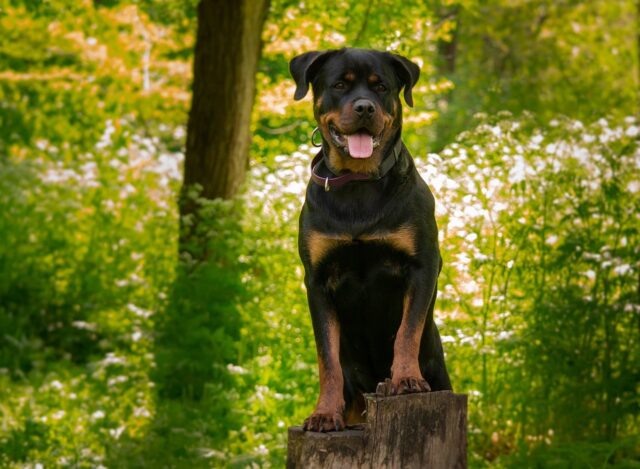
1. How can I tell if my Rottweiler is entering their senior year?
Rottweilers are typically considered seniors around 7 to 8 years old, though this can vary based on individual health and genetics. Signs that your Rottweiler is entering their senior years include decreased energy levels and a preference for more restful activities. They may become less enthusiastic about long walks or vigorous play and might spend more time napping. Physical changes such as graying fur around the muzzle, decreased muscle mass, and a duller coat are common indicators of aging. Additionally, they might experience stiffness or difficulty moving, especially after resting, which can indicate arthritis. Behavioral changes, like increased anxiety, confusion, or sleep patterns, may also occur. Regular veterinary check-ups are essential to monitor these changes and manage emerging health issues, ensuring your Rottweiler remains healthy and comfortable in their senior years.
2. What are common health issues in aging Rottweilers?
Aging Rottweilers are prone to several common health issues. Arthritis and hip dysplasia are prevalent, leading to joint pain and stiffness that can affect mobility. Rottweilers are also at risk for heart conditions, including cardiomyopathy and aortic stenosis, which can impact their cardiovascular health. Cancer is another concern, with Rottweilers being predisposed to certain types, such as osteosarcoma (bone cancer) and lymphoma. Additionally, they may develop hypothyroidism, which can cause weight gain, lethargy, and skin problems. Eye issues, like cataracts, can also grow with age. Regular veterinary visits, including heart screenings and blood tests, are crucial for early detection and management of these conditions, ensuring a good quality of life in their senior years.
3. How should I adjust my Rottweiler’s diet as they age?
As Rottweilers age, their metabolism slows down, and they may become less active, increasing the risk of weight gain. It is important to adjust their diet to maintain a healthy weight and support their overall health. Senior dog food formulas are typically lower in calories but contain higher levels of essential nutrients, such as protein and fiber, to support aging muscles and digestion. These formulas often include supplements like glucosamine and chondroitin for joint health and omega-3 fatty acids for a healthy coat and skin. Feeding smaller, more frequent meals can help digestion and prevent bloating, which Rottweilers are prone to. Always ensure your Rottweiler has access to fresh water. Consult your veterinarian to create a diet plan tailored to your dog’s needs, especially if they have health issues like heart disease or arthritis.
4. How much exercise does an aging Rottweiler need?
While aging Rottweilers may not have the same endurance as in their younger years, regular exercise is still important for maintaining their health and mobility. Aim for at least 30 minutes of light to moderate exercise daily. This can include short walks, gentle playtime, or indoor activities like fetching a soft toy. Exercise helps maintain a healthy weight, strengthens muscles, and supports joint health, which is particularly important for Rottweilers prone to arthritis and hip dysplasia. Be mindful of their physical limitations and watch for signs of fatigue or discomfort, adjusting the intensity and duration of exercise accordingly. Mental stimulation is also important, so include activities like puzzle toys or training exercises to keep their minds sharp. Always consult your vet before changing your exercise routine, especially if they have existing health issues.
5. How can I help my Rottweiler manage arthritis?
Arthritis is common in aging Rottweilers, causing joint pain and stiffness. To help manage arthritis, maintain a healthy weight for your dog to reduce stress on their joints. Provide a comfortable orthopedic bed to support their joints while they rest. Regular, low-impact exercise, such as gentle walks or swimming, can help maintain mobility and muscle strength. Dietary supplements like glucosamine and chondroitin can support joint health, and omega-3 fatty acids can reduce inflammation. Your veterinarian may also recommend anti-inflammatory medications or pain relievers to manage discomfort. In some cases, physical therapy or acupuncture may be beneficial. Regular veterinary check-ups are crucial for monitoring the progression of arthritis and adjusting the treatment plan as needed.
6. Should I be concerned about my Rottweiler’s dental health?
Dental health is crucial for aging Rottweilers, as they are prone to dental issues such as plaque buildup, gum disease, and tooth decay. Poor dental health can lead to pain, difficulty eating, and more serious health problems like heart disease. Regular brushing with dog-specific toothpaste is the best way to maintain dental hygiene. Dental chews and toys designed to clean teeth can also help reduce plaque and tartar buildup. It’s important to schedule annual dental check-ups with your vet, who can perform professional cleanings and address any issues early on. If your Rottweiler shows signs of dental problems, such as bad breath, drooling, or reluctance to eat, seek veterinary care immediately. Maintaining good dental hygiene can significantly improve their health and quality of life.
7. How can I keep my aging Rottweiler comfortable at home?
Consider making a few adjustments around the home to keep your aging Rottweiler comfortable. Provide a supportive orthopedic bed to relieve pressure on their joints and ensure a warm, cozy resting place. If your Rottweiler has difficulty navigating stairs or getting onto furniture, consider using ramps or pet steps. Keep their food and water bowls comfortable to reduce strain on their neck and back. Ensure their living area is free from drafts and maintains a comfortable temperature, as older dogs can be more sensitive to cold. Regular grooming and nail trimming are important to keep them comfortable and mobile. Maintaining a calm and quiet environment can help reduce anxiety and stress, especially if they have developed vision or hearing impairments.
8. What should I do if my Rottweiler is losing their hearing?
If your Rottweiler is experiencing hearing loss, there are several ways to help them adjust. Use hand signals or visual cues for commands, as these can be more effective than verbal ones. Ensure you approach them from the front to avoid startling them and consider using vibrations, such as gently tapping the floor or bed, to get their attention. Creating a consistent routine can help them feel secure and reduce anxiety. Keep them on a leash outside, as they may not hear potential dangers like approaching vehicles. Avoid loud noises that could startle them at home and provide a safe, calm environment. Consult your vet for further advice and possible treatments, and consider using products like vibrating collars if recommended.
9. How do I manage my Rottweiler’s weight as they age?
Managing your Rottweiler’s weight is crucial as they age to prevent obesity and related health issues like diabetes and joint problems. Adjust their diet to include fewer calories, and opt for high-quality senior dog food with balanced nutrients. Measure their food portions accurately and avoid giving them too many treats. Incorporate regular, moderate exercise into their routine to help maintain a healthy weight and muscle mass. Activities like short walks, gentle play, or swimming are ideal, as they provide exercise without straining the joints. Regular weigh-ins and veterinary check-ups can help monitor their weight and overall health. Addressing weight management early can prevent more serious health complications and improve their quality of life in their senior years.
10. How can I mentally stimulate my aging Rottweiler?
Mental stimulation is important for aging Rottweilers to keep their minds sharp and prevent cognitive decline. Engage them with interactive toys, such as puzzle feeders, which can challenge their problem-solving skills and provide entertainment. Training sessions, even if just reinforcing basic commands, can be mentally stimulating and help maintain their cognitive abilities. Scent games, like hiding treats for them to find, can also be enjoyable and mentally engaging. Regular socialization, whether with other dogs or new people, can provide new experiences and mental engagement. Keep activities short and positive, and tailor them to your dog’s needs and energy levels. Regularly rotating their toys and introducing new ones can keep their interest piqued and prevent boredom.



